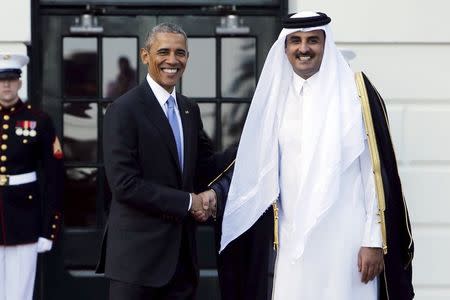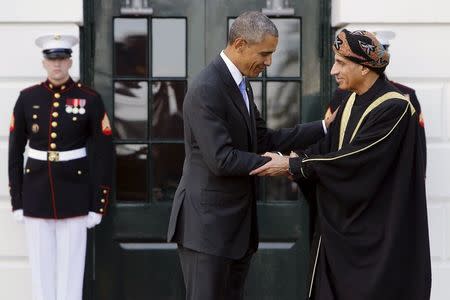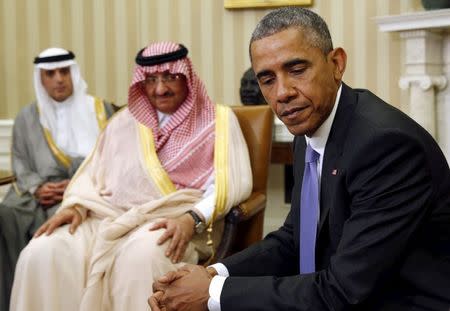Obama meets two Saudi princes after King sent regrets
By Jeff Mason WASHINGTON (Reuters) - President Barack Obama on Wednesday discussed U.S. efforts to forge an international nuclear deal with Iran during talks with Saudi leaders and went out of his way to play down the absence of Saudi King Salman from a summit likely to be dominated by tensions over the topic. Obama met with Saudi Arabia's Crown Prince Mohammed bin Nayef and Deputy Crown Prince Mohammed bin Salman at the White House after King Salman pulled out of the visit. "The United States and Saudi Arabia have an extraordinary friendship and relationship that dates back to (President) Franklin Roosevelt," Obama said at the start of the meeting. "We are continuing to build that relationship during a very challenging time," he said. King Salman decided abruptly to skip the White House meeting and a summit of the Gulf Cooperation Council at the president's Camp David retreat in Maryland outside Washington on Thursday. The White House has sought to counter perceptions that his absence was a snub that would undermine efforts to reassure the region Washington remains committed to its security in the face of Iran's power and influence. Obama said he and the Saudi leaders would discuss how to build on a ceasefire in Yemen and work towards "an inclusive, legitimate government" in Saudi Arabia's impoverished neighbour, where a Saudi-led coalition has been bombing Iran-supported Houthi rebels. He did not mention the Iran nuclear talks in his remarks to the media. White House spokeswoman Bernadette Meehan said the leaders discussed the "importance of a comprehensive agreement" between Iran and world powers "that verifiably ensures the exclusively peaceful nature of Iran’s nuclear programme," referring to efforts by the United States and five other world powers to reach an agreement on curbing Iran's atomic programme. They also discussed efforts to counter Islamic State militants and cooperate to resolve conflicts in Iraq, Syria and Yemen, she said. White House Josh Earnest said King Salman had not expressed any specific concerns about the agenda at Camp David when he met Secretary of State John Kerry in Riyadh last week, and added it was unprecedented that two high profile Saudi leaders were attending. "That is an indication that the Saudis certainly take all of this seriously," Earnest told reporters. The Gulf Cooperation Council includes Saudi Arabia, Kuwait, Qatar, Bahrain, the United Arab Emirates (UAE) and Oman. U.S. officials have portrayed the summit as a working meeting rather than a symbolic get-together. But the absence of many top Arab leaders, in addition to King Salman, is viewed as a reflection of frustration with Obama’s pursuit of the international nuclear deal with Iran and a perceived U.S. failure to support opposition fighters in Syria. Obama called Saudi Arabia a critical partner in the fight against Islamic State and highlighted his interactions with the two leaders who came in King Salman's place. Crown Prince bin Nayef said his country attached great importance to the "strategic and historic relationship" with Washington. Obama did not have private meetings on his public schedule with the leaders from the other countries. They arrived at the White House later on Wednesday evening for a dinner with the president. (Additional reporting by Matt Spetalnick; Editing by David Storey and Frances Kerry)




